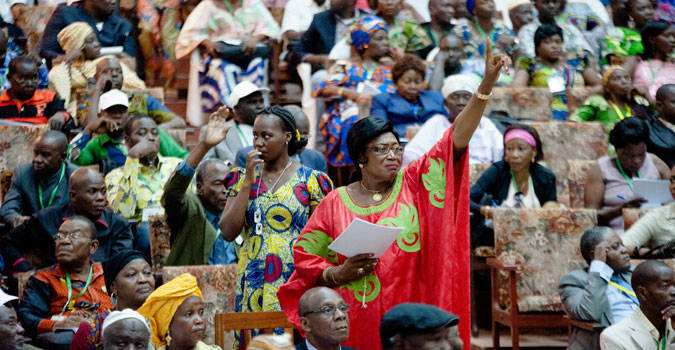
Women leaders and organizations in Africa have a long engagement with Women, Peace and Security (WPS) and have been instrumental in forming core parts of the agenda. Wednesday, March 20th, FOKUS, the Norwegian Council for Africa, and Changemaker Norge, brought together experts to discuss examples of current WPS efforts with Ugandan women’s rights activist, Gorett Rwabunumi Komurembe, in dialogue with Director at the Norwegian Ministry of Foreign Affairs, Maria Sørheim-Rensvik, and PRIO Research Director Louise Olsson.
The panel, moderated by Sahana Sriskandarajah at Norwegian Council for Africa, outlined key contributions by African states and organizations to increase awareness in Norway of the history and progress of WPS, including the Windhoek Declaration contributing to resolution 1325, the first resolution on WPS in the Security Council. Today, 30 member states of the African Union have crafted National Action Plans (NAPs) on Women, Peace, and Security and grassroot organizations are actively promoting WPS implementation in conflict areas. Despite this progress, like the general global trend, many African countries struggle with limited representation and participation of women in peace processes, as well as insufficient monitoring and oversight mechanisms.
Rwabunumi Komurembe shed light on the practical implementation of the WPS agenda in Uganda. Despite Uganda's legal frameworks, cultural norms often hinder women's participation, compounded by prevalent issues such as domestic violence. She therefore emphasized the significance of facilitating women's empowerment through educational initiatives aimed at fostering awareness of their inherent rights. Sørheim-Rensvik underscored Norway's support for WPS initiatives in Africa. While resources and political will remain challenges, Norway has focused on practical approaches, including the development of action plans and partnerships with local organizations.
Olsson brought up key factors and conditions identified in research that can speak to how pathways forward can be identified. For example, armed conflict can be understood as a shock for society which opens up pathways for improvements in women’s rights. This appear to stem from the fact that women’s mobilization often increases as women are directly affected by conflict or the broader effect of conflict, which in turn brings changes to gender roles and understandings of what women can do. However, these only carry over to the post-war phase if they become part of political reforms. To contribute to women’s involvement and gender awareness in peace agreement negotiation and implementation are therefore critical.
The panel also addressed specific challenges, such as funding constraints and the need for inclusive participation. They emphasized the importance of grassroots engagement, education, and addressing cultural barriers to women's rights. While the prioritization of the WPS agenda has improved, challenges in more organized opposition and pushback persist. These are central to strategically address as the agenda is about to turn 25 in 2025.





